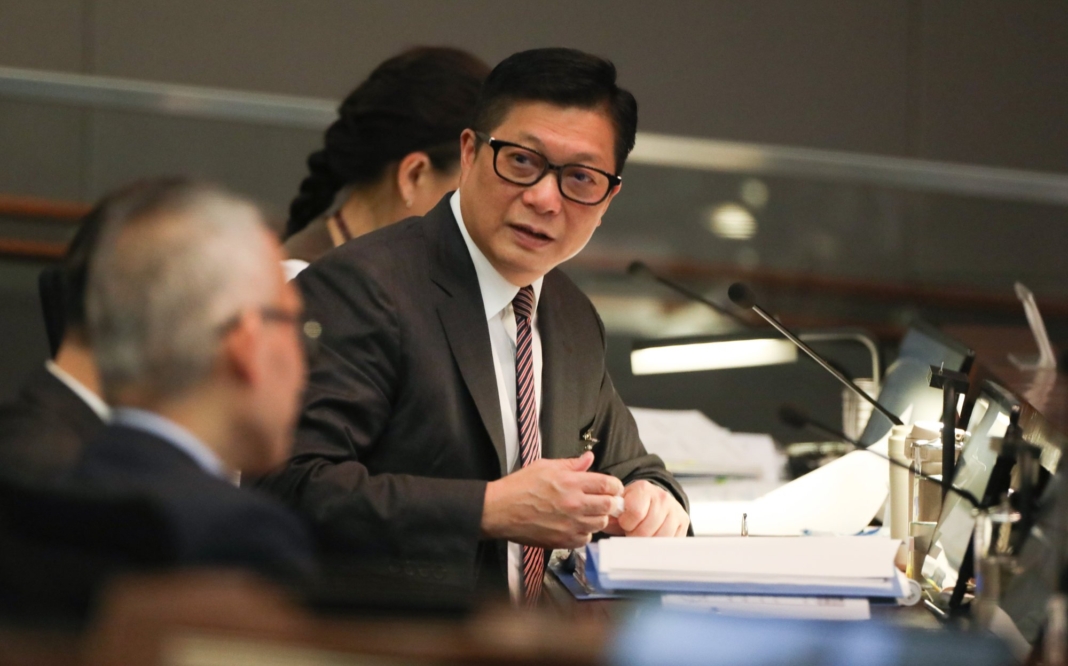For the first time since the bill was introduced to the legislature last Friday, Secretary for Security Chris Tang Ping-keung signalled clearly that the government was “actively” considering amendments, such as removing a six-month waiting period after the issuance of a court warrant before a suspect could be deemed an absconder.
At least 126 out of 181, or about 70 per cent, of the bill’s clauses have been vetted in 36 hours of meetings held since last Friday.
The committee has reached the last clause of the main ordinance of the bill, which Hong Kong is required to legislate under Article 23 of the Basic Law, the city’s mini-constitution. The remainder of the bill is concerned with supplementary amendments to existing laws.

March 12
Sanctioning absconders
On the suspension of professional qualifications:
-
The qualification of the absconder will be resumed after he or she is brought to the court.
-
If the absconder gets qualifications to practise in foreign countries based on what those acquired in Hong Kong, the security minister will also notify foreign organisations about the relevant suspension in the city.
On temporarily pausing permission or registration to carry out business or to be employed:
On cancellation of Hong Kong passports:
-
It is a “cancellation” and not a temporary suspension.
-
The government will inform foreign countries and airlines.
-
Authorities will consider prohibiting absconders from applying for new Hong Kong passports.
On labelling a suspect an absconder:
-
The government is considering making its first amendment to the bill to remove a requirement that authorities must wait six months after a court warrant is issued before they can label someone an absconder.
-
If the condition is removed, the security chief will be able to classify a suspect as an absconder soon after the issuance of a court warrant and notifying relevant parties, provided the minister has reasonable grounds to believe the accused is not in the city.
Amendments to criminal procedures
-
The court will not be able to take evidence by live television link from a person outside Hong Kong, as the government considers that will pose national security threats
-
Anyone guilty of national security offences – including sedition – will not be given a suspended sentence. While legal academic Simon Young Ngai-man of the University of Hong Kong had described the change as “troubling”, no lawmaker raised concerns.
Chief executive’s “administrative instructions” for public servants
-
Multiple lawmakers questioned the scope of “public servants”, finding it either unclear or too narrow for the purpose.
-
The government agreed to provide more specifics on what public servants and agencies will be covered by such instructions.
-
Heeding the advice of two former security officials, the government will consider a new clause to allow authorities to make subsidiary legislation under the proposed law to provide details on procedures and scope.
US ambassador to China in rare 2-day Hong Kong visit amid Article 23 bill talks
US ambassador to China in rare 2-day Hong Kong visit amid Article 23 bill talks
Chief executive’s issuance of certificate designating state secrets
-
The proposed legislation grants greater power than the Beijing-imposed national security law because the chief executive will now be able to certify whether a piece of material is a state secret outside of a court proceeding.
-
The certificate will allow the city leader to “put dispute to rest” when there is controversy.
Protecting national security personnel from doxxing and harassment
-
Multiple lawmakers said it was not enough to cover only “family members”, demanding protection for unmarried partners or other people living together with such personnel.
-
The government said an emotional suspect swearing at law enforcement officers during arrest was unlikely to be considered an act of harassment under the proposed law.
-
Wordings such as “a reasonable person”, “having regard to all the circumstances” and “in fact” will set a high bar for prosecutors to prove the victim is facing psychological harm and concern, according to officials.
Source: scmp.com



